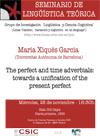Seminario de Lingüística Teórica LyCC: "The perfect and time adverbials: towards a unification of the present perfect"
Mié, 28-11-2012; 01:00
Sede CCHS
16:30 hrs. Sala Gili Gaya 1E
Por María Xiqués García (Universidad Autónoma de Barcelona)
In this talk, I will deal with the nature of some of the readings associated with the Present Perfect (henceforth PrP). I first re-examine the hodiernal PrP (i.e., Luisa ha llegado hace un rato) to show that the hodiernal PrP, which has been traditionally assumed to refer to completed situations that have taken place on the same day as the utterance, does not correspond to a Simple Past (from now onwards SP) interpretation (i.e., E,R_S). I also show that the nature of termination, which has traditionally defined hodiernal PrP sentences, is not linked to outer aspect, but to the aspectual class of the predicate. Moreover, the 24-hour rule (Giorgi and Pianesi 1997, Brugger 2001) is not that strict and it is mainly dependent on the presence of time adverbials. Hence, I argue that the hodiernal is not a separate reading of the PrP, but a subcase of the existential perfect. The crucial difference between the Catalan as well as some Spanish varieties and the English PrP is not that the former languages have an extra reading, but rather that they allow for the presence of time adverbials which fix the eventuality on the time axis. I will also review the universal interpretation of the PrP (i.e., Ha vivido solo desde que llegó a Londres) which requires a stative predicate and a durational time adverbial (Iatridou et al. 2002). I will particularly investigate if there are examples which qualify as unambiguous universal PrP sentences in Catalan as well as in some Spanish varieties and English to assess whether the universal interpretation is semantically encoded in the meaning of the PrP or, like in the case of the hodiernal PrP, it is also a subcase of the existential PrP which arises from the influence of other linguistic factors.
Organiza: Grupo de Investigación "Lingüística y Ciencia Cognitiva". Línea Cambio, variación y cognición en el lenguaje.
.

Cartel119.71 KB
Abstract LyCC25.42 KB



